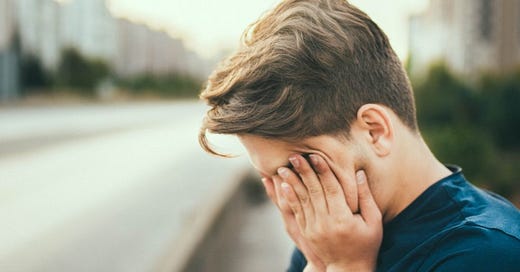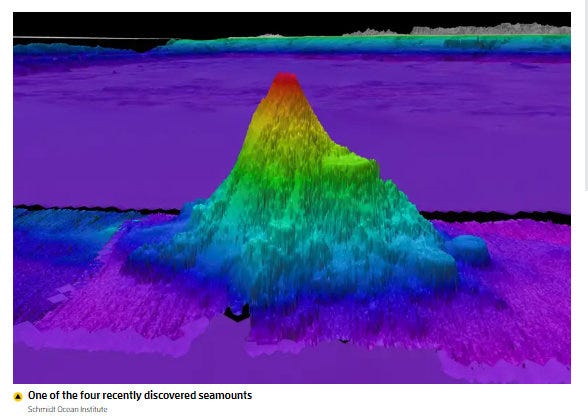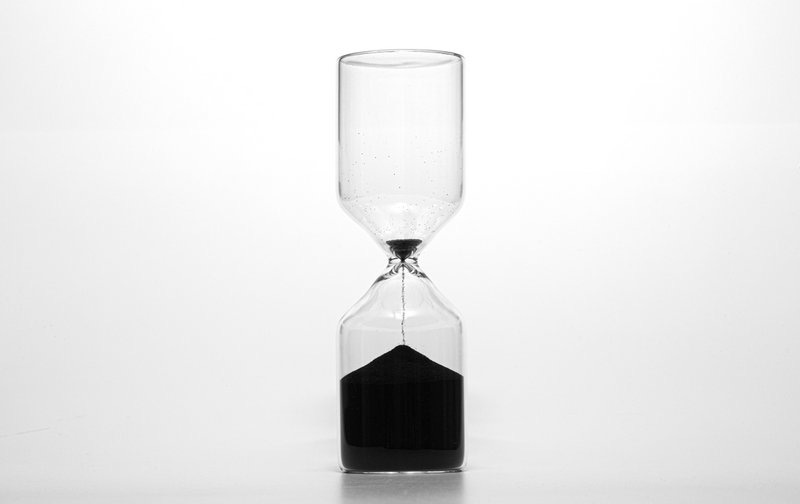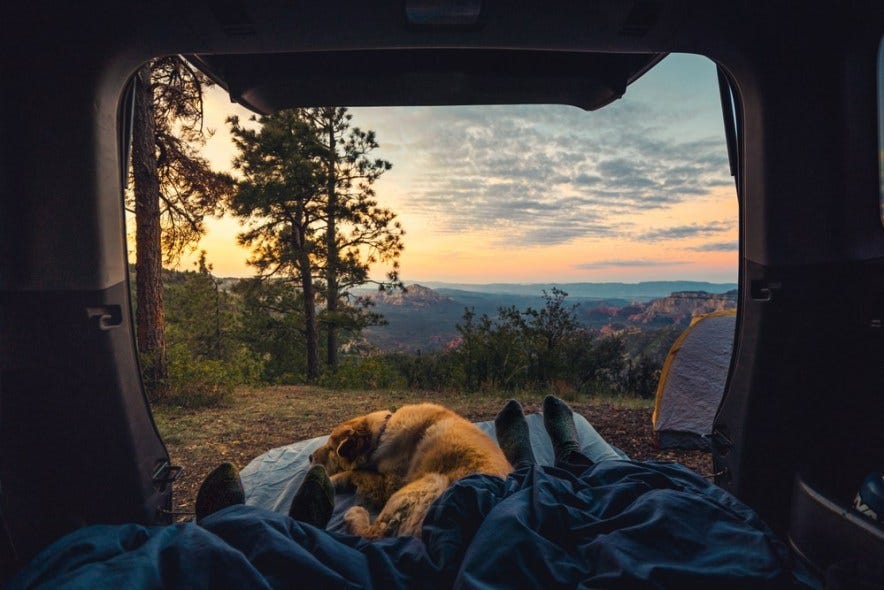Hello! This is Everything Is Amazing, a newsletter about science, curiosity and the joy of a good “WOW!” you can feel right down to your boots.
(Watch the ‘Ames Window’ video at the end of this newsletter for a good example.)
Before we get started, an update to season 4’s look at the longest mountain chain in the world - because, just look at this thing.
Via New Scientist (& hat-tipping Jodi, finder of science links), it’s an image from the Schmidt Ocean Institute’s investigations of the sea bed off the west coast of Central & South America, and it’s one of four utterly massive sea-mounts (underwater mountains) they’ve just announced the discovery of.
I can’t tell if the dramatic verticality of this image is being exaggerated for effect. Possibly not! The biggest is 2,681 metres from base to tip, which is over 1.5 miles high. Ghagh.
And in case that hasn’t given your imagination enough of a workout:
“Scientists on the Schmidt Ocean Institute’s research vessels Falkor and Falkor (too) have already discovered 29 seamounts. Data suggests there are between 45,000 and 100,000 underwater mountains still to be found because most of the seafloor that lies beneath the open ocean remains unmapped.”
Secondly and entirely unrelatedly, the following video about knitting - but also not about knitting - is an absolute delight, so if you’re reading this as an email, please click on the image below to open it up and watch it:
(A hat-tip-with-a-flourish to Brendan Leonard, since this was in his last Friday Inspiration newsletter, which I really hope you’re already signed up for.)
Okay! Forward we go to sleeplessness and horror - accompanied by a gruff, British voiceover from the idiot who writes this newsletter.
When I first started writing for a living, my head was filled with a lot of damn-fool notions about writing - the kind you’d never hear from a highly accomplished veteran, but you would hear from someone on social media whose only body of work was a loud, desperate-sounding need to appear authoritative. Since I was learning to be Extremely Online a lot quicker than I was learning to write, I internalised a lot of those confidently wrong ways to become A Proper Writer.
One of these was around intentional sleep deprivation, to stimulate the imagination. It’s true that as you push far beyond your normal sleep cycle, you reach a point where you’re hallucinating on your feet. Woah! Wouldn’t that be a good source of really imaginative and out-the-box thinking? suggested the person whose tweet I can’t now find, probably because they’re now either deceased or working in investment banking.
Because of the amount of ridicule they got, including from medical doctors, I quickly learned this was a terrible idea. But I remained curious about this - and on my old blog, I wrote the following piece, which I’ve updated after chatting to my better half, Mariana, who is a doctor.
(Mariana is also writing on Substack, and recently ran a mini-course on handling stress in which sleep plays a big part. She knows her stuff. Sign up to her for free below.)
So, scientifically speaking - what actually happens to your body when you refuse to sleep?
In short: it’s a living nightmare.
A third of your life (around 230,000 hours) will be spent unconscious. It sounds ridiculous, even wasteful – yet if you don’t ensure you’re spending around 7 to 9 hours a day in the mysterious state of radically altered consciousness we call “sleep”, you’ll quickly fall apart in ways that are nerve-wracking to contemplate.
How quickly?
Let’s take a look.
Hour 18
For whatever important or foolish reason, you’re still up – and it’s starting to get uncomfortable.
Getting sleepy is a remarkable thing. Your head nods, your eyelids feel heavy, and your thoughts congeal – and it’s all entirely involuntary, operating to a biological schedule you have no direct control over and very little hope of fighting for very long. It’s as demanding as the urge to pee, and for good reason: the staggeringly complex factory of our body requires regular downtime for maintenance, and our brain knows how important this is.
But you’re a modern human, and you think you know better. Fuelled by caffeine, bright artificial light and an alarming amount of stimulation, you’re burning the midnight oil like never before. You power past the 940-minute mark (the average amount of time UK folk stay awake) and keep going.
Things are about to get really grim.
Fortunately, you won’t remember much of it - which is why sleep-depriving yourself to come up with great ideas is a mug’s game. It’s bleakly ironic that one of the first casualties of sleep deprivation is your ability to form memories. It’s like your brain is an email Inbox that hits capacity: anything new will just bounce right out again. Your problem-solving skills are similarly impaired, along with your ability to make quick decisions.
You can’t think, you can’t decide, you can’t organise anything inside your head – so you default to the last thing you were doing, because it’s easier to just keep going.
This kind of “brain fog” will have catastrophic consequences a few hours from now.
Hour 20
You spill your third coffee of the night on your lap – and it takes you a few seconds to even notice. Your hand-eye coordination is tanking, making you clumsy, slow to react and increasingly dangerous to be around. The night seems young – but you’re already in a state equivalent to being legally drunk.
At this part of the day, when you’re normally asleep, your pineal gland (a pea-sized lump near the centre of your brain) starts squirting out melatonin, a hormone that regulates your sleep cycle. Melatonin is like a klaxon announcing the end of your body’s daily work shift – a signal that it’s time to down tools and get everything fixed and recharged for the next day’s grind. But by staying awake, pouring white light into your eyes and caffeine into your gullet, you’re suppressing melatonin production and attempting to override the wisdom of your body clock’s schedule.
Like other animals, human beings run on circadian rhythms – daily cycles of activity that combine to make a largely self-sustaining, largely self-repairing system. When you’re awake, your body is doing one set of activities. When you sleep, it switches to another. The combined effect of those wake-time and sleep-time processes together is your continued existence as a living, breathing person. It’s how you’ve stayed alive until today.
But now you’re in real trouble.
Your blood pressure is spiking dangerously. On a normal day, it rises more or less steadily from the moment you wake, and drops again as you sleep – making the latter a natural form of blood pressure medication. Even a single day’s interrupted sleep can make this deadly. Every year when Spring Daylight Saving Time kicks in and the clocks go forward, robbing everyone of an hour of sleep, there’s a 20-25% increase in heart attacks – and a roughly equivalent drop at the end of the year when the clocks fall back.
Right now, there’s nothing stopping your hypertension. You’re like a nuclear reactor without cooling rods. If you’re young and fit, the risk of stroke or heart failure will be a little lower compared to some – but videogamer Chen Rong-yu was just 23 years old when his heart gave out, in front of a screen in an internet cafe in Taiwan, after spending 23 hours in a row playing League Of Legends.
You’re also not feeling that great. Your sleep cycle produces the hormone testosterone, vital for building strength, muscle mass and bone density in both men and women (in whom it combines with estrogen to provide the same effect). You’re feeling weaker and listless, and everything’s more of an effort – so your stress levels climb, releasing cortisol which helps you keep awake at the cost of letting the insulin in your body do its job. Congrats, night-owl: you’re now on the road to type 2 diabetes.
There’s also that tickly cough you’re getting: as pro-inflammatory proteins build up in your body (normally flushed out during sleep) and your immune cells decline in number (normally topped up during sleep), you’re way more likely of developing something nasty in the long run – like cancer, which is why night-time shift-work is now classed as carcinogenic.
You’re feeling really bad. But don’t worry – that awareness won’t last long.
Hour 24
You’re a day without sleep now, and you realise someone’s talking to you.
“Are you ok? Did you hear what I just said?”
Of course you didn’t. Your body is panicking because you’ve ignored every danger sign it’s thrown at you so far, and now it’s using its last desperate trick: pulling the plug completely. For 10-30 second bursts, your brain is shutting itself down, even while the rest of you appears awake. Your eyes are open, you’re moving, you may even be talking to people – but you’re definitely not present.
It’s called microsleeping – a deceptively benign term for something that kills at least 1500 people every year in the U.S. alone. Occasionally, the consequences can literally be devastating. At 1.23am on the 24th April 1986, the sleep-deprived, repeatedly-microsleeping shift workers at the Chornobyl nuclear power plants made an error that started the worst nuclear power accident in human history.
A full day’s unbroken wakefulness is called Total Sleep Deprivation, but again, don’t let that term fool you. Things are about to get a hell of a lot worse.
Hour 36
Somehow, for reasons that surely aren’t worth what you’re currently putting yourself through, you’re still awake.
It’s been a full day and a half of keeping your eyes open, and you’re about to lose your best chance of saving yourself.
In a 2007 study, Matthew Walker and a team of scientists at Berkeley and Harvard studied 24 healthy individuals who hadn’t slept for 35 hours. In each person, they found their amygdala – believed to be a major processing centre for emotions in the brain – had become far more reactive to negative stimuli, along with a “loss of top-down, prefrontal control”. The apparent upshot of all this: you become more depressive and judgmental, you take things a lot harder, and you lose your ability to put how you’re feeling into the wider context of what you know to be true.
Any decisions you make at this point are increasingly, maybe severely irrational.
That’s why you decide to stay up a while longer.
Hour 48
Ahhh. You feel like you’re in a better place now. The sun is shining, you’re surrounded by friends, life is good. And is that a human-sized rabbit waving at you over there?
Yes, you’re hallucinating. Even with their superb levels of fitness and body control, endurance athletes frequently see things that aren’t there. Take the experience of ultrarunner Steve Pero on the route of Colorado’s Hardrock 100 endurance run in 2013:
“There were the row houses lining the final miles of the Bear Creek Trail. Even in the middle of the night, families were out barbecuing on their decks, laughing and having a good time.
After the houses, he encountered a camper who had rudely set up his tent in the middle of the trail. A few yards later, Pero spotted hundreds of 1970s-style transistor radios, each hand-painted with pictographs of human faces and leaping animals.
Bizarre, absurd … and entirely nonexistent.”
You’re losing your grip on reality – and heading towards a condition resembling acute psychosis.
Along with this loss of conscious control is something even more alarming. Until now, throughout your whole life, your body has been working on your behalf, every second of every day, in such a staggeringly complex way that if you had to think about it, your conscious mind wouldn’t know where to start. Thankfully it’s all done automatically – because that’s the deal we make with our bodies. We give them the fuel and conditions they require to keep working, and they do that hard work for us.
But now you’ve successfully withheld one of your body’s most basic needs, it’s collapsing into anarchy.
You’re now at increased risk of death from a multitude of conditions because your brain’s control of those autonomous processes is going awry – and that message hasn’t reached your conscious brain yet. You’re becoming increasingly hypometabolic, a common feature of neurodegenerative diseases, where your body is increasingly unable to manage your energy intake – and dysautonomia is kicking in, sending certain automatic nervous system processes into energy-burning overdrive. It’s a disastrous combo.
Beyond this point, life gets very difficult indeed.
Spare a thought for the sufferers of Fatal Familial Insomnia (FFI), a terribly cruel hereditary prion disease that attacks the part of the brain containing the thalamus and hypothalamus, which regulate the body’s metabolic processes, including its sleep cycles. The average survival time for FFI is 18 months – and there is no known cure.
And as for you? Incapable of making the right call and hallucinating wildly, you’re stumbling forward into the death zone of sleeplessness. Now it’s a gruesome race between your dimming consciousness making a fatal judgement call and your body seizing up completely – and the finish-line can’t be far away.
Lights out, friend.
How To Sleep Better
A recent survey suggested the 2020 COVID-19 lockdown had more than half of the population of the UK struggling to sleep.
If you’re feeling reassured that you’ll never be daft enough to stay up for two or more days straight, you should bear in mind that accumulated sleep debt is almost as catastrophic for your health in the long-term – so you should act accordingly.
However, making yourself sleep is impossible, as anyone can attest after a long night of turning hither and thither. All we can do is create the bodily and environmental conditions for sleep to arise naturally and overtake our forever racing minds. Which is, of course, damn hard work.
You can find a wealth of advice on sleeping from medical experts online - being a Brit, I’d certainly start with the NHS’s page on it.
But here are two powerful assists that I can recommend from personal experience.
1. Microdose On Melatonin
My friend
who writes the newsletter has a superbly well-researched article on managing the sleep disorder known as jet lag using microdoses of melatonin supplements. Fantastic piece, with links aplently, so I’d suggest you start your further reading there. (She also did a piece on Seasonal Affective Disorder than I recommend to you.)My own experience: due to a stressful few years with family stuff, I was suffering with enough insomnia to accumulate a crippling sleep debt, so I tried melatonin, bought over the counter in Spain.
Within a week I’d upped my nightly sleep hours from five to seven, with a deeper, better-feeling quality of downtime every night - and not only did my energy levels start to creep up again, I also felt a lot more cheerful about life.
2. Sleep Outdoors
In 2017, severely sleep-disturbed Outside editor Erin Berger set herself a challenge:
“Surely, sleeping outside for seven days straight, even if I still had to go to work and couldn’t spend all my waking hours in nature, would get my melatonin spiking at the right times. And if it didn’t, so what—winter had just ended and I really missed camping. My only rule was that I had to sleep in nature every single day.”
A week later:
“My experiment was less than scientific, but I do feel like I gleaned some very real benefits simply by letting sunrise and sunset determine my waking hours: the forced bedtime helped me fall asleep sooner, and the 360 degrees of sunlight and the cawing of the ravens every morning were hard to ignore. By the end of the week, I felt consistently tired whenever I chose to go to bed, and consistently more awake when it was time to start the day, and coffee no longer felt like a mandate. (I still drink it—this isn’t magic.)”
The longest I’ve slept outside is 5 days in a row – but even 1 or 2 days is long enough to feel the benefits (as long as you’re comfortable, so if you’re camping or bivvy bagging, always bring an inflatable mat!). If you can manage once or even twice a week, maybe Friday and Saturday nights, that’d probably work nicely.
If you let natural light guide you and stay away from your glowing gadgets after dark – and if you’ve grown accustomed to the modern-day weirdness of not being indoors – then you should be in for a terrific night’s sleep.
Best of luck!
References:
Average time spent awake in the UK (2014): https://www.statista.com/statistics/326907/awake-time-per-day-uk-by-age-and-gender/
“What is Jet Lag, and 5 Tips to Beat It and Recover Quickly” – Jodi Ettenberg, Legal Nomads
“Dreamland: The Miraculous Cure” - Dr. Mariana Calleja M.D.
Sleep deprivation equivalent to alcoholic intoxication: https://www.ncbi.nlm.nih.gov/pmc/articles/PMC1739867/
Sleep deprivation and heart attacks: https://www.sciencedaily.com/releases/2014/03/140329175108.htm
Microsleeping: https://en.wikipedia.org/wiki/Microsleep
The role of sleep deprivation in human catastrophes: https://www.ncbi.nlm.nih.gov/pmc/articles/PMC2517096/
Daylight saving time shifts and heart attacks: https://www.sciencedaily.com/releases/2014/03/140329175108.htm
“The human emotional brain without sleep”: https://www.cell.com/fulltext/S0960-9822(07)01783-6
“What happens to your body on no sleep” – Wes Judd, Outside
Severe sleep deprivation and hallucinations & psychosis: https://www.ncbi.nlm.nih.gov/pmc/articles/PMC6048360/
“The tragic fate of the people who stop sleeping” – David Robson, BBC Future
“Can you die from sleep-deprivation?“- Robbie Gonzalez and Levi Gadye, Gizmodo Australia
Images: Doğukan Şahin, Wilhelm Gunkel and Jimmy Conover on Unsplash.









That knitting video ❤️❤️❤️❤️❤️❤️
I love sleep so much. Adore it like a pet. Miss it when it's gone. What a wonderful thing sleep is.
My sleep experience when I'm away at a no-electricity, no-internet, no-mobile phone service cabin is completely different than when at home. I fall asleep earlier, sleep better, and have that nighttime "second sleep" broken by a little less than an hour of being awake, which I usually spend looking at the stars. Similar, though not the same, when I'm camping. Artificial light affects us in so many ways we know of, and I'm sure many we don't.
And wonderful timing -- Annabel Abbs, writer of some of my favorite works on walking, just came out with a new book on sleep and insomnia! https://www.penguinrandomhouse.com/books/733810/sleepless-by-annabel-abbs-streets/